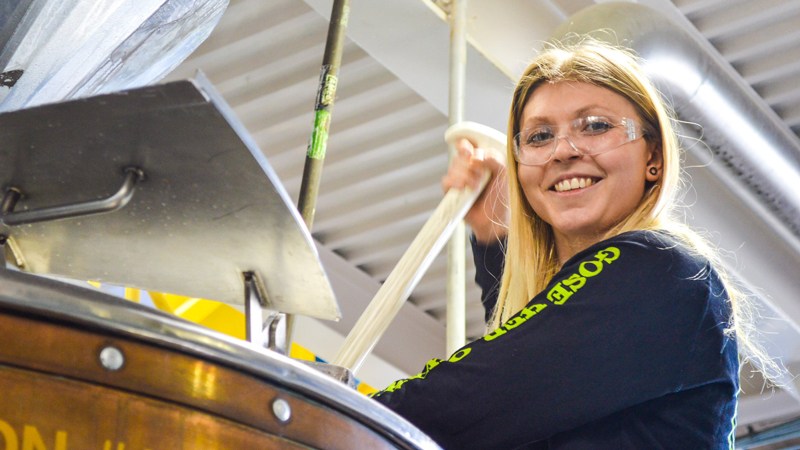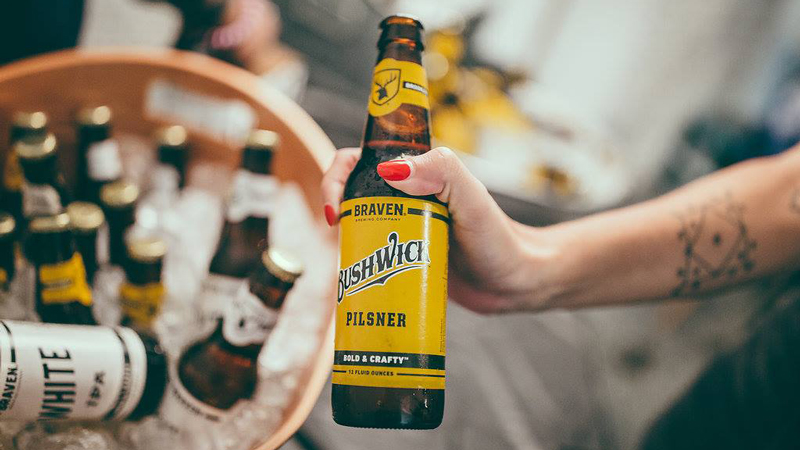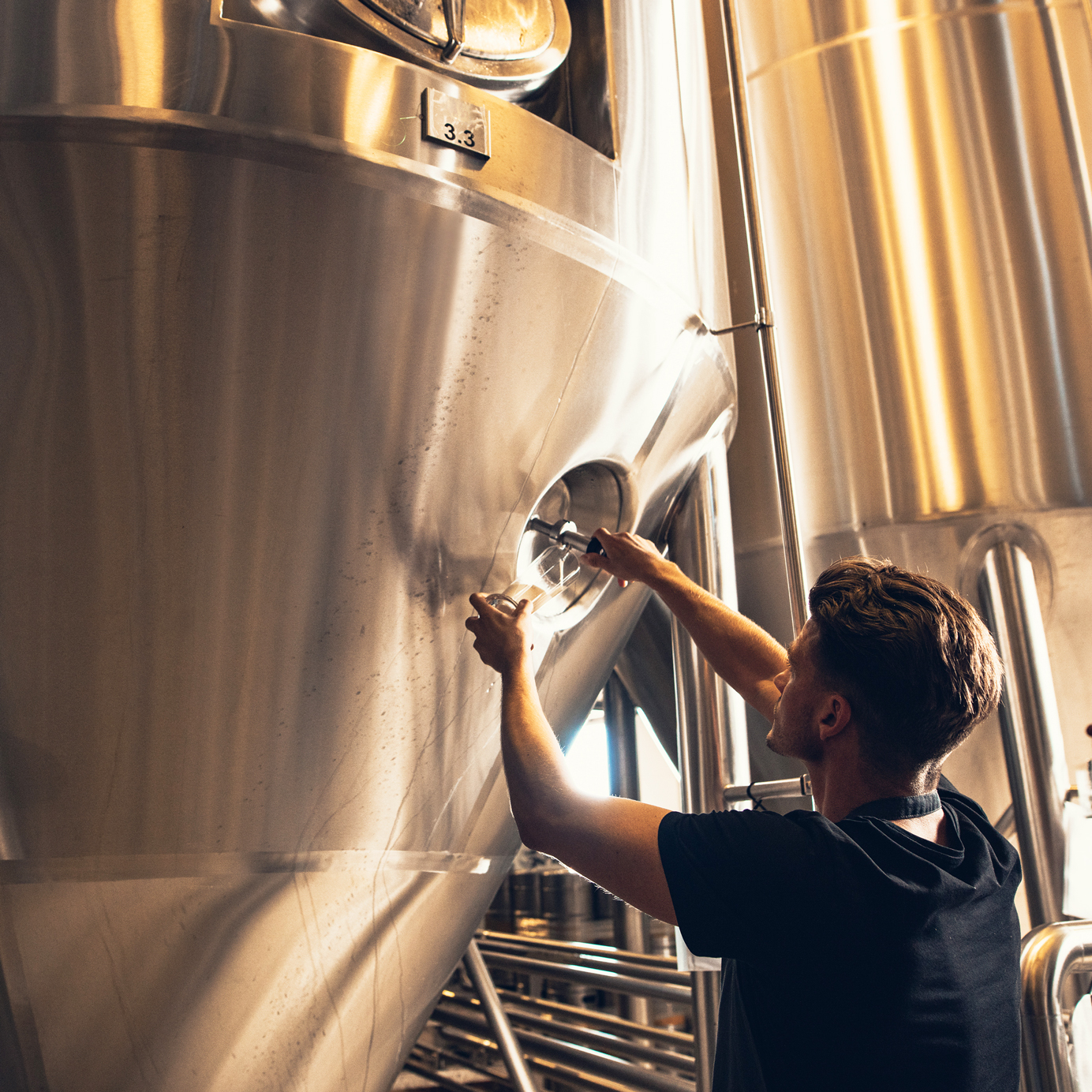“Brewed locally, somewhere,” is the motto of Stillwater Artisanal, an undeniably cool brewer that has called many places home. Born in Baltimore in 2010, and currently based in New York, Stillwater has brewed around the world and is now planning to open a facility in Greenpoint, Brooklyn. Stillwater is a contract brewer, a company that works with a host brewery to produce and package its beer.
It’s a concept that was popularized by Boston Beer Co., creator of Samuel Adams. Boston Beer Co. skyrocketed to early craft beer fame in the 1980s as a bona fide “Boston” brewery, despite the fact its beer was actually produced in Pennsylvania.
In recent years, some members of the industry have started referring to contract brewing as “nomadic” or “gypsy” brewing. This puts a more romantic spin on a concept born out of necessity: companies that don’t have the space, capital, or raw materials making deals with others that do. Such arrangements financially benefit both operations but, in our authenticity-obsessed culture, there has historically been a stigma attached.
“Often, the process felt like an afterthought,” Nathan Borchelt writes in Paste. “And most of the times the beer that resulted was…okay. Good, but nothing that would send anything skyrocketing to the top of Rate Beer.”

Stillwater’s new — or rather, first — facility will be called Production, a delightful misnomer that complicates the contract brewing concept even further. In fact, the new facility will not be producing most of Stillwater’s beers; that job will go to Two Roads Brewing, a Stratford, Conn. brewery that produces its own brands along with those of 13 others.
“Just becoming known as so-called gypsy … I think that concept has probably done more to reverse the stigma of contract brewing than anything else,” Phil Markowski, Two Roads’ master brewer, says.
Co-founded by Brad Hittle, Clement Pellani, Peter Doering, and Markowski, Two Roads was built to brew others’ brands, as well as its own, from the get-go, Markowski says. The team saw a demand for something Markowski refers to as “craft-style contract production” — basically, small-batch beer recipes scaled up to bigger volumes without compromising quality. By creating a facility that was built to produce and support other craft brands, Two Roads helped fuel the concept of what we now know as gypsy brewers.
It also comes down to branding, Markowski says. Brewers like Stillwater, Evil Twin, and Grimm Artisanal Ales “have been able to brand themselves and make contract brewing cool. Perhaps purists in the past [who were] critical of contract brewers reversed their opinion based on a couple cool kids doing contract brewing.”
The reception has been a bit different for Braven Brewing, another of Two Roads’ clients. The Brooklyn-based company had claimed many times (including right here on VinePair) to be bringing beer production back to Bushwick, a neighborhood central to New York’s rich brewing history, for the first time since Prohibition. The problem was, there was no brewery.
Braven spent the majority of its five-year history contract brewing at Saratoga Brewing in Saratoga Springs, N.Y. After Saratoga unexpectedly shut down in January, Braven struck another deal with another brewery in Ipswich, Mass. Now, along with beginning its contract brewing relationship with Two Roads, Braven will finally be opening its own small batch brewpub in Bushwick.
Tricking the public into thinking Braven was actually being brewed in Bushwick was never the intention, say founders Eric Feldman and Marshall Thompson. Thompson tells VinePair they had planned a Bushwick brewery all along, but simply couldn’t raise the capital.

But whether a contract brewer is seen as sexy or deceptive is a fine line. Why do some get the stigma, while others get fawned over? Thompson’s best guess is location — or lack thereof.
“Some breweries get a pass and some don’t,” Thompson says. “The one thing I think it might come down to is, the gypsy brewers don’t lay claim to a geography, so they’re not saying they’re from Brooklyn or from Massachusetts or wherever, they’re just a brand unto themselves. They can just be national — everywhere and nowhere at the same time. If a brewery says ‘we’re from Bushwick,’ but don’t have a brewery here yet, it can rub people the wrong way.”
For die-hard purists, the stigma surrounding contract brewing wanes if, and only if, all other factors of the operation are perfect. (Is it upfront about its production practices? Check. Does it pretend to be something it’s not? Is it, well, cool?) Regardless of subjective intangibles like street credibility and noble intentions, the fact of the matter is, contract brewing is a necessity.
For Two Roads, the challenge isn’t filling tank space, it’s turning down brewers. “The response was greater than we expected,” Markowski says, noting that the brewery has to continually turn down brewers looking to Two Roads to be their host. (Braven confirmed it had been in talks with Two Roads for four years before a space opened up.)
Markowski believes the eventual reversal of the contract-brewing stigma will signify “a general maturing of the industry,” and is something craft beer will see more of as new breweries continue to launch, and existing breweries struggle to stay afloat. “As some brewers have expanded rather aggressively, there are going to be [brewers] with excess capacity looking to fill it,” Markowski says.
At the end of the day, he says, “it’s what’s in the glass that counts.”
